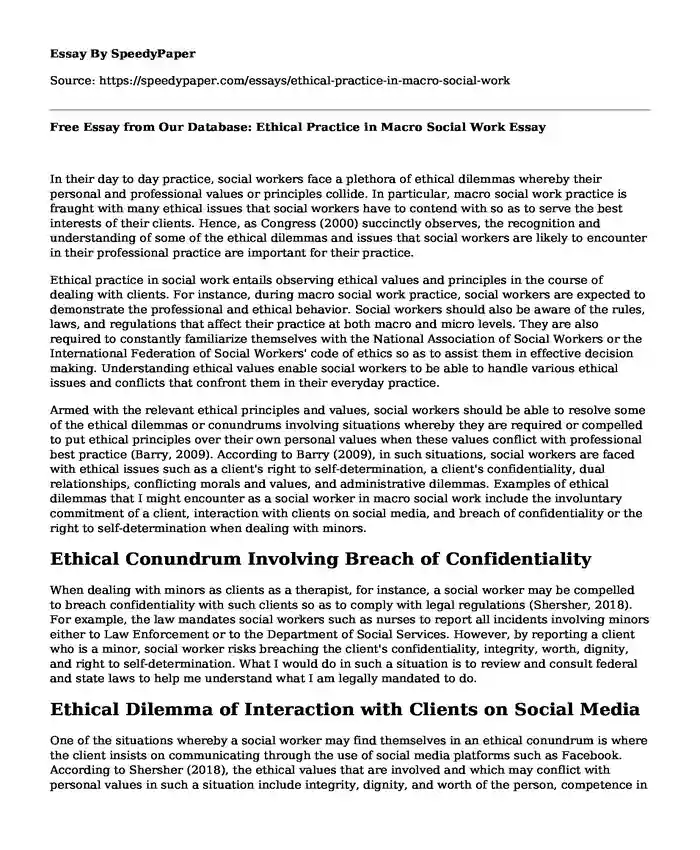
| Type of paper: | Essay |
| Categories: | Social work Ethical dilemma |
| Pages: | 3 |
| Wordcount: | 776 words |
In their day to day practice, social workers face a plethora of ethical dilemmas whereby their personal and professional values or principles collide. In particular, macro social work practice is fraught with many ethical issues that social workers have to contend with so as to serve the best interests of their clients. Hence, as Congress (2000) succinctly observes, the recognition and understanding of some of the ethical dilemmas and issues that social workers are likely to encounter in their professional practice are important for their practice.
Ethical practice in social work entails observing ethical values and principles in the course of dealing with clients. For instance, during macro social work practice, social workers are expected to demonstrate the professional and ethical behavior. Social workers should also be aware of the rules, laws, and regulations that affect their practice at both macro and micro levels. They are also required to constantly familiarize themselves with the National Association of Social Workers or the International Federation of Social Workers' code of ethics so as to assist them in effective decision making. Understanding ethical values enable social workers to be able to handle various ethical issues and conflicts that confront them in their everyday practice.
Armed with the relevant ethical principles and values, social workers should be able to resolve some of the ethical dilemmas or conundrums involving situations whereby they are required or compelled to put ethical principles over their own personal values when these values conflict with professional best practice (Barry, 2009). According to Barry (2009), in such situations, social workers are faced with ethical issues such as a client's right to self-determination, a client's confidentiality, dual relationships, conflicting morals and values, and administrative dilemmas. Examples of ethical dilemmas that I might encounter as a social worker in macro social work include the involuntary commitment of a client, interaction with clients on social media, and breach of confidentiality or the right to self-determination when dealing with minors.
Ethical Conundrum Involving Breach of Confidentiality
When dealing with minors as clients as a therapist, for instance, a social worker may be compelled to breach confidentiality with such clients so as to comply with legal regulations (Shersher, 2018). For example, the law mandates social workers such as nurses to report all incidents involving minors either to Law Enforcement or to the Department of Social Services. However, by reporting a client who is a minor, social worker risks breaching the client's confidentiality, integrity, worth, dignity, and right to self-determination. What I would do in such a situation is to review and consult federal and state laws to help me understand what I am legally mandated to do.
Ethical Dilemma of Interaction with Clients on Social Media
One of the situations whereby a social worker may find themselves in an ethical conundrum is where the client insists on communicating through the use of social media platforms such as Facebook. According to Shersher (2018), the ethical values that are involved and which may conflict with personal values in such a situation include integrity, dignity, and worth of the person, competence in the use of technology, and significance of human relationships. As a social worker, what I would do in such a scenario is to consult the relevant Code of Ethics or the law governing this issue as this will enable me to know whether or not it is legally and ethically appropriate to interact with clients using "less formal" media platforms such as social media.
Ethical Dilemma Involving Involuntary Commitment of a Client
According to Shersher (2018), there are some situations whereas a social worker, one comes across a client who is a danger to themselves or to others and hence has to be restrained through involuntary commitment before they can be treated or attended to. An example of this is a human service worker who has to deal with a mentally ill client. Here, a social worker will be compelled to breach ethical values and principles like the importance of human relationships, self-determination, and worth or dignity of the person. What I would do in such a situation is to abide by the ethical code of conduct for professional social workers so as to know whether or not it is ethical to send a client to involuntary commitment before attending to their needs where they pose a risk to others.
References
Barry, E. (2009). An examination of ethics in social work. Critical Social Thinking: Policy and
Practice, 1, 110-124
Congress, E.P. (2000). What social workers should know about ethics: Understanding and resolving practice dilemmas. Advances in Social Work, 1(1), 1-25
Shersher, J. (2018). Social work ethics: 5 common dilemmas and how to handle themresponsibly. Retrieved March, from https://www.mswguide.org/blog/social-work-ethics/
Cite this page
Free Essay from Our Database: Ethical Practice in Macro Social Work. (2022, Apr 13). Retrieved from https://speedypaper.com/essays/ethical-practice-in-macro-social-work
Request Removal
If you are the original author of this essay and no longer wish to have it published on the SpeedyPaper website, please click below to request its removal:
- Free Essay Sample on Electronic Contracts Law
- Dree Essay on the Disadvantages of the Discretionary Policy
- The Concept of Power - Free Essay Sample
- Free Paper: Relationship between the Size of Payroll and the Performance of a Baseball Team
- Essay Sample on Body Commodification
- Hybridity in the Book Ceremony, Free Essay Sample
- Christianity and Slavery in Early America
Popular categories




